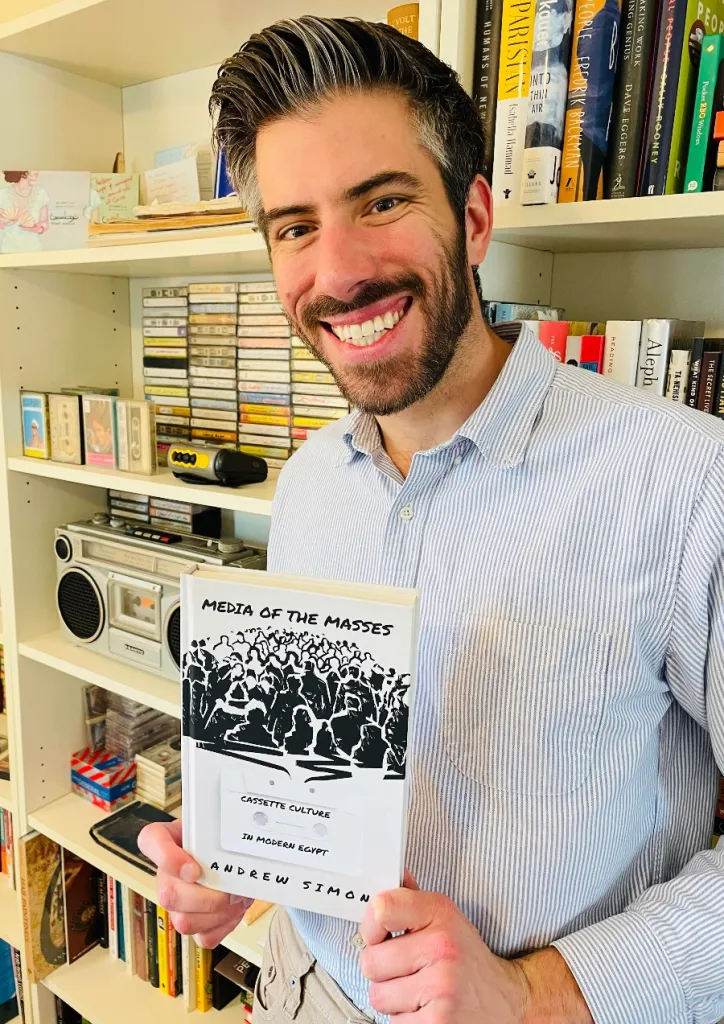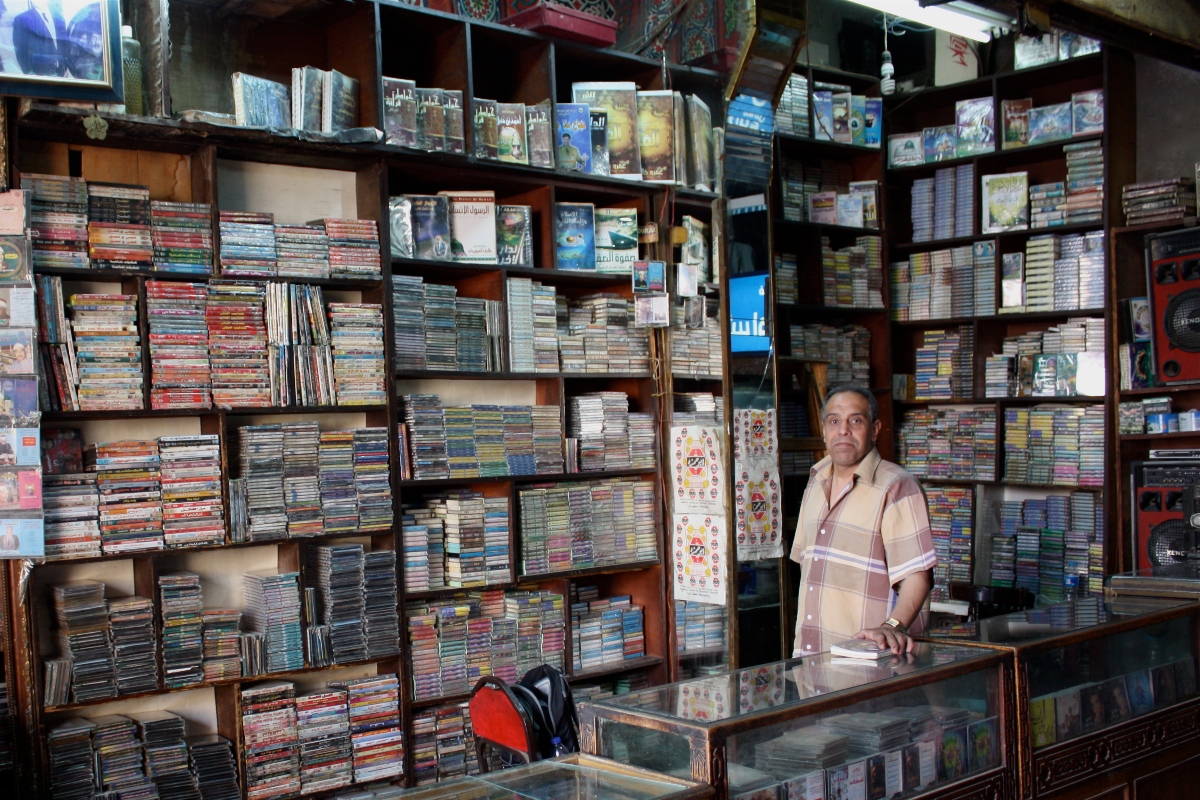By Ian Greer
What does an Umm Kulthum song mean when sung at a protest? Or the music of Sheikh Imam in the middle of a 21st-century digital revolution? These are some of the questions that puzzled a young AUC student during the turbulent 2010s and which he has answered in a new, groundbreaking book that traces the unwritten popular history of modern Egypt.
Andrew Simon (CASA '10) is a senior lecturer in the faculty of Middle Eastern studies at Dartmouth College in the United States and a graduate of the Center for Arabic Study Abroad @AUC (CASA@AUC). He is also the author of Media of the Masses: Cassette Culture in Modern Egypt (Stanford University Press, 2022), a book that delves deep into the modern history of Egyptian popular culture, spread through new technological mediums.

The story of Simon's book, the product of 10 years of work, begins during his time as CASA@AUC student in 2010.
"I arrived the summer prior to the revolution," recalls Simon. "The CASA program at the time was based in the downtown campus, right next to the midan (Tahrir Square). So we had mass demonstrations right outside of our classroom. I was living with a few friends in an apartment in Munira just up the street a few blocks away, and we attended demonstrations almost every day. It's something that I remember quite vividly, that would shape not only me personally but my academic interests going forward."
Outside of the classroom, Simon was struck above all by the "acoustic culture" of the protests: instruments, slogans, chants and songs by Egyptian singers old and new, deployed for political action sometimes beyond their original contexts. Simon returned to the United States to write on Egypt's soundscape.
The acoustic culture of Egypt's revolution had its roots in new cultural mediums of the late 20th century, Simon found. "When it came time to write a dissertation, the thing that I realized connects all these topics is cassette tapes. They were present in all of these stories. That's when I set out to write a history of cassette technology that became a history of Egypt."
An Unofficial History
In Media of the Masses, Simon calls cassettes "the internet before the internet." Using cheap cassette tapes, anyone could create culture, even culture opposed to the ruling regime. Among the most prominent adopters of the technology was Sheikh Imam, a singer and social critic popular in late 20th-century Egypt who figures prominently in Simon's book. Imam's 'Nixon Baba,' a witty critique of Anwar Sadat's welcome of the American President Richard Nixon in 1974, is among Simon's favorite Egyptian songs.
Focused on the music, ideas and concerns of everyday Egyptians over the decades, Media of the Masses is an unofficial history of modern Egypt, far from sweeping national narratives. Without sources available in the Egyptian National Archives, Simon relied on oral history, Egyptian films, and decades of local newspapers and magazines to construct his own popular history of the country.
The history of the 1970s and 1980s in Egypt is typically focused on the period's major wars, governance and Islamic revival movements, not pop culture, Simon explains. "In this book, I tried to shift all of those things. So rather than looking at momentous events, I focus on more mundane things like music. Rather than looking at religion, I tried to look at secular, profane things. Rather than looking at the consolidation of power, I look at people who challenged political authority. I tried to offer a very different story and focus on people who were, frankly, written out of history."
The singer Sheikh Imam is a prime example; popular in his own time but practically absent from the mainstream Egyptian historical record. "I think he's someone whose songs really resonated with people and meant something to them, but scholars and historians haven't written about him because they probably don't deem him as a worthy subject matter," observes Simon. "That's something I tried to change in this book."
Decidedly light on academic theories, Media of the Masses is meant to be engaging and accessible, something anyone can understand, just like the popular music it documents. "My primary audience are Egyptians; I wrote this book to be read here in Cairo," says Simon, adding that the independent Egyptian publishing house Dar El Shorouk will release an Arabic translation of the book later this year. "It was a dream of mine for a long time to have an Arabic translation," Simon says. "It will hopefully be available at a future Cairo Book Fair."
Cairo Connections
Now an academic and fluent in Arabic, Simon fondly remembers how the CASA program boosted his Arabic-language skills and drew him irresistibly into Arab popular culture. "CASA was the first time I felt like I wasn't studying Arabic as a language," remarks Simon. "We weren't studying grammar. Instead, we studied subjects in Arabic. We would learn Arabic literature while immersed in Egyptian culture."
Simon's book is a testament to his enduring connection to Egypt and its people, first formed during his time as a CASA student at AUC more than 10 years ago. He spent years living in the country after finishing his undergraduate degree and has been coming back ever since. Despite Egypt's many changes since 2010, Simon says that the most important part of the country's culture -- its people -- are still the same.
"The man who sells aseer asab [sugarcane juice], the people working at the grocery store and laundromat -- all of those individuals are still there. And they recognize me," he says. "When I come back to Cairo, they tell me 'You look a little older. You didn't have as much gray hair when we first met 15 years ago.' So some things have changed, and other things have remained the same."
Main image: Abu Hamza Cassette Shop in Cairo. Photos courtesy of Andrew Simon


